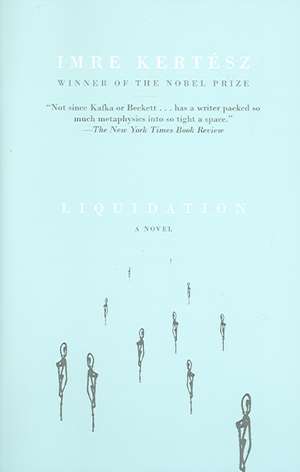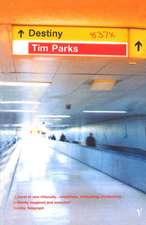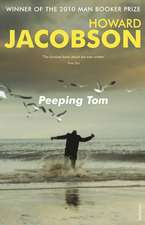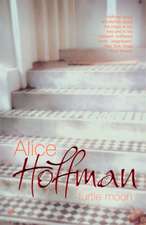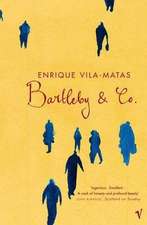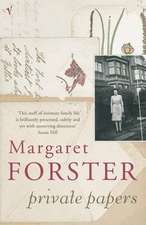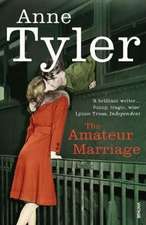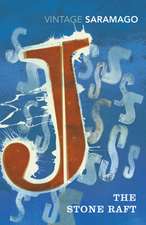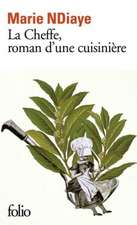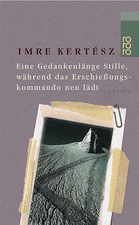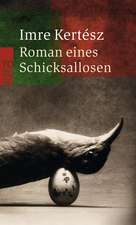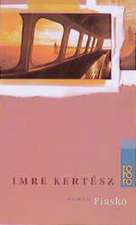Liquidation
Autor Imre Kertesz Traducere de Tim Wilkinsonen Limba Engleză Paperback – 30 sep 2005
Ten years after the fall of communism, a writer named B. commits suicide, devastating his circle and deeply puzzling his friend Kingsbitter. For among B.’s effects, Kingsbitter finds a play that eerily predicts events after his death. Why did B.–who was born at Auschwitz and miraculously survived–take his life? As Kingsbitter searches for the answer –and for the novel he is convinced lies hidden among his friend’s papers–Liquidation becomes an inquest into the deeply compromised inner life of a generation. The result is moving, revelatory and haunting.
| Toate formatele și edițiile | Preț | Express |
|---|---|---|
| Paperback (2) | 51.07 lei 24-35 zile | +15.62 lei 4-10 zile |
| Vintage Publishing – 7 sep 2017 | 51.07 lei 24-35 zile | +15.62 lei 4-10 zile |
| Vintage Books USA – 30 sep 2005 | 87.95 lei 6-8 săpt. |
Preț: 87.95 lei
Nou
Puncte Express: 132
Preț estimativ în valută:
16.83€ • 17.39$ • 14.01£
16.83€ • 17.39$ • 14.01£
Carte tipărită la comandă
Livrare economică 25 martie-08 aprilie
Preluare comenzi: 021 569.72.76
Specificații
ISBN-13: 9781400075058
ISBN-10: 140007505X
Pagini: 129
Dimensiuni: 133 x 201 x 10 mm
Greutate: 0.15 kg
Editura: Vintage Books USA
ISBN-10: 140007505X
Pagini: 129
Dimensiuni: 133 x 201 x 10 mm
Greutate: 0.15 kg
Editura: Vintage Books USA
Notă biografică
Imre Kertész, who was born in 1929 and imprisoned in Auschwitz and Buchenwald as a youth, worked as a journalist and playwright before publishing Fatelessness, his first novel, in 1975. He is the author of Looking for a Clue, Detective Story, The Failure, The Union Jack, Kaddish for an Unborn Child, and A Galley-Slave’s Journal. He was awarded the Nobel Prize for Literature in 2002. He lives in Budapest and Berlin.
From the Hardcover edition.
From the Hardcover edition.
Extras
Let us call our man, the hero of this story, Kingbitter. We imagine a man, and a name to go with him. Or conversely, let us imagine the name, and the man to go with it. Though this may all be avoided anyway since our man, the hero of this story, really is called Kingbitter.
Even his father was already called that.
His grandfather too.
Kingbitter was accordingly registered on his birth certificate under the name Kingbitter: that, therefore, is the reality, on which—reality, that is to say—Kingbitter did not set too much store nowadays. Nowadays—a late year of the passing millennium, in the early spring of, let us say, 1999, on a sunny morning at that—reality had become a problematic concept for Kingbitter, but, more serious still, a problematic state. A state from which, on the report of Kingbitter’s most private feelings, it was reality above all that was lacking. If he were in some way compelled to make use of the word, Kingbitter invariably added “so-called reality.” That, however, was a very meager satisfaction; nor indeed did it satisfy Kingbitter.
Kingbitter, as he did frequently nowadays, was standing at his window and looking out onto the street below. This street offered the most mundane and ordinary sights of Budapest’s mundane and ordinary streets. The muck-, oil-, and dog-dirt-spattered sidewalk was lined with parked cars, and in the one-yard gaps between the cars and the leprotically peeling house walls the most mundane and ordinary passersby were attempting to go about their business, their hostile features an outward clue to their dark thoughts. Every now and then, perhaps in a hurry to overtake the single file inching along in front, one of them would step off the sidewalk, only for an entire chorus of rancorous car horns to give the lie to any groundless hope of breaking free from the line.
On the benches in the square over the way, at least the benches not already stripped of their planks, were perched the homeless of the area, with their bundles, shopping bags, and plastic flasks. Above a bushy beard sprouted a knitted cap of carmine red, its dangling bobble merrily brushing the forbidding fuzz. A man wearing the battered cap of an officer of some nonexistent army was in a faded, buttonless heavy overcoat bound by a coy silk belt of gaudy floral design that had no doubt once belonged to a woman’s housecoat. On bunioned female feet, peeking from beneath a pair of jeans, silvered evening shoes with worn-down heels; farther off, on a narrow strip of sparse turf, legs drawn up in catatonic inertness, sprawled a figure indistinguishable from a bundle of rags, laid out by alcohol or drugs, or maybe both.
As he looked at the down-and-outs, Kingbitter all at once became conscious that he was again looking at the down-and-outs. Without doubt, Kingbitter was nowadays lavishing far too much attention on the down-and-outs. He was quite capable of frittering away whole half hours of his (as it happened, worthless) time by the window, with the captivation of a voyeur who is completely unable to tear himself away from the obscene spectacle unfolding before him. On top of which, this Peeping Tom behavior was for Kingbitter attended by a sense of guilt and, at one and the same time, a loathsome attraction which debouched ultimately into a form of nauseating anguish or existential angst. The moment this anguish took unmistakable shape within him, Kingbitter, having attained as it were his baffling activity’s even more baffling goal, would turn away from the window with almost an air of satisfaction and step toward the table, on which were strewn various manuscripts, opened and spread out like the carcasses of birds.
Kingbitter himself was well aware that there was something unsettling about this obsessive link that he had developed, one could say without his knowledge and consent, with the down-and-outs. In truth, he suffered from it as from an illness. All he needed to do was decide not to step toward the window anymore. Or to step toward the window solely in order to blow the cobwebs away or for some other practical purpose of that kind. But then, all at once, he would again catch himself at the window looking at the down-and-outs.
Kingbitter suspected that some intelligible meaning lay hidden behind this curious passion of his. Indeed, he had a feeling that if he were to succeed in deciphering that meaning, then he would also have a better understanding of his life, which he did not understand nowadays. He had a feeling as if nowadays rifts were separating him from that formerly almost palpable constant that he at some time had been acquainted with as his personality. For Kingbitter the Hamlet question did not run “To be or not to be?” but “Am I or am I not?”
Kingbitter leafed almost distractedly through one of the typescripts that was sprawled on the table. It was a fairly bulky pile of paper, the manuscript of a play. On the cover sheet stood the title, liquidation, then the designation of its genre: Comedy in Three Acts. Below that: The setting is Budapest, in 1990. He grasped the sheet between finger and thumb so as to turn the page, but then gave way nonetheless to the dubious pleasure bestowed by the stage directions:
(A dingy editorial office in a dingy publishing house. Shabby walls, sagging book stacks, yawning gaps between the books stowed on the shelves, dust, neglect; although there are no signs that a move is under way, the desolate impermanence of a moving operation prevails all around. In the room are four desks, four work spaces. On each desk are a typewriter—a dust cover on one or two of them—piles of books, manuscript sheets, files. The windows overlook a courtyard. At the rear is a door leading to a corridor. Somewhere in the distance there is late-morning sunlight; in the dingy editorial office, dingy artificial lighting.
Kürti and his wife, Sarah, and Dr. Obláth are present in the room, ill at ease as they sit waiting around a desk that, as will become clear, belongs to Kingbitter.)
Kingbitter began to be seized by the passion to read on, the strange obsession that had so decisively shaped his life. He liked the play’s opening exchanges.
Kürti: Abominable. Execrable. I could throw up. This building. A palace once, you know. Those stairs. This room. All this.
Obláth (to Sarah): Tell me, do you know what he’s on about?
Sarah: He’s bored.
Obláth: I’m also bored. You’re also bored.
Sarah: But he’s radically bored; that’s the only radicalism he has now. That’s what has been left him from the glory days. Boredom. He takes it with him everywhere, like an angry shaggy terrier that he sets on others from time to time.
Kürti: We were ordered to be here for eleven . . .
Sarah (in a mollifying, almost pleading tone, as if speaking to a child): No one “ordered” us. Kingbitter asked us to bring the material into the office. By eleven, if possible.
Kürti: Eleven-thirty, and not a soul around. That doesn’t bother you two, of course. You just sit there and tolerate it, the same way everything in this country is tolerated. Every deception, every lie, every bullet in the brains. Just as you are already tolerating bullets in the brains that will be implemented only after the bullet is put in your brains.
Kingbitter laughed out loud. Or, to be more precise, he heard the distinctive curt snort that nowadays passed for a laugh with him. The sound welled up, so to say, from the belly and came out more as a dry grunt than a laugh; to be sure, there was not much in the way of mirth and happiness tinkling in it. He leafed on in the manuscript until his eye was again caught by a stage direction:
(Kingbitter hurries in, a thick file under his arm.)
Kingbitter: Do forgive me. It couldn’t be helped. Sorry, sorry. The conference ran way overtime.
Sarah: You look stressed. Did something happen?
Kingbitter: Nothing special; the publishing house is to be liquidated, that’s all. The state is not going to throw money at the losses any longer. It has financed them for forty years; from today onward it is not going to finance them.
Obláth: That’s logical. It’s another state now.
Kürti: The state is always the same. The only reason it financed literature up till now was in order to liquidate it. Giving state support to literature is the state’s sneaky way for the state liquidation of literature.
Obláth (in ironic acknowledgment): An axiomatic formulation.
Sarah: And what is to become of the publishing house? Will it cease to exist?
Kingbitter: In its present form. (He shrugs, a bit dejectedly.) But then, everything and everyone is ceasing to exist in its present form.
Yes, Kingbitter well recalled that morning nine years before. He recalled how, having come out of the editorial conference (the so-called editorial conference), a thick file under his arm, he had entered that room. Kürti, Sarah, and Obláth had been waiting for him there, by his desk. He himself had said near enough exactly what was in the play. The only snag was that by the time that scene was played out in reality, almost word for word, the person who had written the play, and that scene in it, was no longer alive.
He had committed suicide.
The police had found the syringe and the morphine ampoules as well.
Kingbitter had retained sufficient presence of mind to rescue the bulk of the manuscripts (a dazed Sarah had taken possession of the scanty correspondence) before the authorities arrived.
He had found this stage work too among the private papers. A good nine years ago, when Kingbitter had first read the play, the story was only just beginning, and it had soon carried on, with the character the play called Kingbitter—exactly like the real-life Kingbitter—retaining sufficient presence of mind at the scene of the suicide to rescue the bulk of the manuscripts before the authorities arrived. Then, having secured the literary haul and greedily set upon it, Kingbitter had come across the stage work and, shortly afterward, the scene in which it turns out that he had retained sufficient presence of mind,
et cetera. Thereafter, the scenes had succeeded one another, turn and turn about, in the drama as in reality, to the point that, in the end, Kingbitter did not know what to admire more: the author’s—his dead friend’s—crystal-clear foresight or his own, so to say, remorseful determination to identify with his prescribed role and stick to the story.
Nowadays, though, with the lapse of nine years, Kingbitter was interested in something else. His story had reached an end, but he himself was still here, posing a problem for which he more and more put off finding a solution. He would either have to carry on his story, which had proved impossible, or else start a new story, which had proved equally impossible. Kingbitter undoubtedly could see solutions to hand, both better ones and worse; indeed, if he reflected more deeply, solutions were all he could see, rather than lives. The character named Kürti in the play, for instance, had nowadays opted for the solution of falling ill. The last time Kingbitter paid a visit to him, he had found him in bed, surrounded by a sphygmomanometer, a little table on which were tablets of varied hues and shapes, packs of medicines, even a tiny gadget with which Kürti could self-inject; Sarah was sitting apathetically in the kitchen. This Kürti had once been a sociologist, retreating into some insignificant job during the seventies and eighties and meanwhile writing with unflagging zest his big monograph “on untimely consciousness and its cognitive roots in Hungary.” Prior to that he had even done time in prison, and though the secret police were no longer beating prisoners by then, they had still managed to land a blow so wretchedly that he had gone deaf in his left ear.
Kingbitter leafed back a few sheets in the play. We are back again at the opening scene, with Kürti, his wife, Sarah, and Dr. Obláth waiting for him, Kingbitter. Obláth says something, Kürti does not understand him, and Obláth repeats it at the top of his lungs.
Sarah: There’s no need to yell. Just don’t speak into his battered ear.
Obláth (awkwardly apologetic): I always forget!
Kürti (who has meanwhile set off on a walk around the room, inspects the bookshelves and furnishings, picks out
a book or two): Better you do. It was all over and done with long ago. (He rummages tentatively among the books, seeming to speak more or less in a trance.) And strangely enough, it all came to an end just recently. Quite suddenly. Just when it was in the home stretch. The régime was overthrown, and I’m not going to pretend it was me who overthrew it. A general liquidation is in full swing, and I’m not going to join in. I’ve become a spectator. And I’m not even spectating from the front rows in the stalls but from somewhere up in the gods. Maybe I’m worn out, but it could be that I never truly believed in what I believed. That would be the unseemlier alternative, because then they would have smashed my ear in for no reason at all. That is the assumption I’m inclining to these days. (He breaks off and ponders, book in hand.) I did time for no reason, dragged the millstone of a police record around for no reason, was on probation for years for no reason, and I’m no hero, I merely botched up my life.
Obláth (consolingly): Everyone here makes a botch of his life. That’s the local specialty, the genius loci. Anyone who doesn’t botch up his life here simply has no talent.
Kingbitter again heard the laugh that sounded more like an irate snort than a laugh. He regretted that he had missed that scene (he recalled that he had entered the room only later, with the thick file under his arm) and so had been unable to take part in the conversation. He liked the style, that wry gallows humor armed with the semblance of omniscience; a most serviceable style it was, the dialect of the initiated, protecting them from their disillusionments, their fears, their well-concealed childish hopes.
Kingbitter looked at his watch and established that he had nothing at all to do that day either. It was slowly getting on for noon. He fleetingly wondered how he had spent his day so far, but he would have been hard put to give an answer to that. True, he had been living a lively interior life today: he had dreamed something, he had awoken with an erection, and while shaving he had been dogged by a feeling that today he needed to decide, though he could not see clearly what it was he needed to decide, besides which he was all too aware of his own inability to make any decisions.
Despite that, the thought did cross Kingbitter’s mind that he ought to do something about finding a theater to do the play, the comedy (or tragedy?) “Liquidation.”
He was now in the ninth year of considering that.
Indeed, Kingbitter was now in the ninth year of considering whether he was handling the literary estate with due diligence.
There were all sorts of things in the legacy: prose pieces and notes, diary extracts and embryonic short stories (and the play Liquidation, of course). It was just that a crucial bit was missing—or at least so Kingbitter was convinced.
Apart from which—and this was Kingbitter’s most secret thought, so secret that he maybe kept it a secret even from himself—if he were to be rid of the play, he would, in some sense, also be getting rid of himself. He might also be rid of the oppressive sense of implausibility that stuck to him nowadays, haunting him like some disagreeable deficiency, at all times and in all places, like Peter Schlemihl and his missing shadow.
The story had begun on that morning when Kingbitter, thick file under his arm, had entered the publishing office where Kürti, his wife, Sarah, and Dr. Obláth were waiting for him.
In the file in question was the literary estate of Kingbitter’s dead friend—let’s call him B. for short (or Bee, as he liked to call himself). The way the estate had come into Kingbitter’s hands was that Kingbitter had retained sufficient presence of mind to rescue the bulk of the manuscripts before . . . but he has already had occasion to mention that.
Kingbitter had appeared at the editorial conference (the so-called editorial conference) that morning, file under his arm, with the firm intention of recommending that the publishing house, of which he was one of the literary editors, publish the legacy, and offering himself to undertake the editorial work relating to publication (forgoing any fees, naturally).
Except that the conference had been convened in order to announce the sad fact that the publishing house was operating at a loss, and for that reason they would be obliged to undertake certain administrative and financial maneuvers, from the stupefyingly tedious analysis of which all that Kingbitter grasped—but grasped with utter clarity—was that he would be ill advised to bring up the matter of his recommendation at this moment in time.
He again began to take an interest in what they had actually been talking about before he, having left the so-called conference, entered the room where his friends were awaiting him.
Obláth has just been discoursing on something in his habitual, passionately high-flown manner, his words followed by a prolonged hush. Sarah is sniffling, occasionally raising her handkerchief to dab her reddened eyes; Kürti drags his chair a bit farther away and wraps himself in a detached, profound silence.
From the Hardcover edition.
Even his father was already called that.
His grandfather too.
Kingbitter was accordingly registered on his birth certificate under the name Kingbitter: that, therefore, is the reality, on which—reality, that is to say—Kingbitter did not set too much store nowadays. Nowadays—a late year of the passing millennium, in the early spring of, let us say, 1999, on a sunny morning at that—reality had become a problematic concept for Kingbitter, but, more serious still, a problematic state. A state from which, on the report of Kingbitter’s most private feelings, it was reality above all that was lacking. If he were in some way compelled to make use of the word, Kingbitter invariably added “so-called reality.” That, however, was a very meager satisfaction; nor indeed did it satisfy Kingbitter.
Kingbitter, as he did frequently nowadays, was standing at his window and looking out onto the street below. This street offered the most mundane and ordinary sights of Budapest’s mundane and ordinary streets. The muck-, oil-, and dog-dirt-spattered sidewalk was lined with parked cars, and in the one-yard gaps between the cars and the leprotically peeling house walls the most mundane and ordinary passersby were attempting to go about their business, their hostile features an outward clue to their dark thoughts. Every now and then, perhaps in a hurry to overtake the single file inching along in front, one of them would step off the sidewalk, only for an entire chorus of rancorous car horns to give the lie to any groundless hope of breaking free from the line.
On the benches in the square over the way, at least the benches not already stripped of their planks, were perched the homeless of the area, with their bundles, shopping bags, and plastic flasks. Above a bushy beard sprouted a knitted cap of carmine red, its dangling bobble merrily brushing the forbidding fuzz. A man wearing the battered cap of an officer of some nonexistent army was in a faded, buttonless heavy overcoat bound by a coy silk belt of gaudy floral design that had no doubt once belonged to a woman’s housecoat. On bunioned female feet, peeking from beneath a pair of jeans, silvered evening shoes with worn-down heels; farther off, on a narrow strip of sparse turf, legs drawn up in catatonic inertness, sprawled a figure indistinguishable from a bundle of rags, laid out by alcohol or drugs, or maybe both.
As he looked at the down-and-outs, Kingbitter all at once became conscious that he was again looking at the down-and-outs. Without doubt, Kingbitter was nowadays lavishing far too much attention on the down-and-outs. He was quite capable of frittering away whole half hours of his (as it happened, worthless) time by the window, with the captivation of a voyeur who is completely unable to tear himself away from the obscene spectacle unfolding before him. On top of which, this Peeping Tom behavior was for Kingbitter attended by a sense of guilt and, at one and the same time, a loathsome attraction which debouched ultimately into a form of nauseating anguish or existential angst. The moment this anguish took unmistakable shape within him, Kingbitter, having attained as it were his baffling activity’s even more baffling goal, would turn away from the window with almost an air of satisfaction and step toward the table, on which were strewn various manuscripts, opened and spread out like the carcasses of birds.
Kingbitter himself was well aware that there was something unsettling about this obsessive link that he had developed, one could say without his knowledge and consent, with the down-and-outs. In truth, he suffered from it as from an illness. All he needed to do was decide not to step toward the window anymore. Or to step toward the window solely in order to blow the cobwebs away or for some other practical purpose of that kind. But then, all at once, he would again catch himself at the window looking at the down-and-outs.
Kingbitter suspected that some intelligible meaning lay hidden behind this curious passion of his. Indeed, he had a feeling that if he were to succeed in deciphering that meaning, then he would also have a better understanding of his life, which he did not understand nowadays. He had a feeling as if nowadays rifts were separating him from that formerly almost palpable constant that he at some time had been acquainted with as his personality. For Kingbitter the Hamlet question did not run “To be or not to be?” but “Am I or am I not?”
Kingbitter leafed almost distractedly through one of the typescripts that was sprawled on the table. It was a fairly bulky pile of paper, the manuscript of a play. On the cover sheet stood the title, liquidation, then the designation of its genre: Comedy in Three Acts. Below that: The setting is Budapest, in 1990. He grasped the sheet between finger and thumb so as to turn the page, but then gave way nonetheless to the dubious pleasure bestowed by the stage directions:
(A dingy editorial office in a dingy publishing house. Shabby walls, sagging book stacks, yawning gaps between the books stowed on the shelves, dust, neglect; although there are no signs that a move is under way, the desolate impermanence of a moving operation prevails all around. In the room are four desks, four work spaces. On each desk are a typewriter—a dust cover on one or two of them—piles of books, manuscript sheets, files. The windows overlook a courtyard. At the rear is a door leading to a corridor. Somewhere in the distance there is late-morning sunlight; in the dingy editorial office, dingy artificial lighting.
Kürti and his wife, Sarah, and Dr. Obláth are present in the room, ill at ease as they sit waiting around a desk that, as will become clear, belongs to Kingbitter.)
Kingbitter began to be seized by the passion to read on, the strange obsession that had so decisively shaped his life. He liked the play’s opening exchanges.
Kürti: Abominable. Execrable. I could throw up. This building. A palace once, you know. Those stairs. This room. All this.
Obláth (to Sarah): Tell me, do you know what he’s on about?
Sarah: He’s bored.
Obláth: I’m also bored. You’re also bored.
Sarah: But he’s radically bored; that’s the only radicalism he has now. That’s what has been left him from the glory days. Boredom. He takes it with him everywhere, like an angry shaggy terrier that he sets on others from time to time.
Kürti: We were ordered to be here for eleven . . .
Sarah (in a mollifying, almost pleading tone, as if speaking to a child): No one “ordered” us. Kingbitter asked us to bring the material into the office. By eleven, if possible.
Kürti: Eleven-thirty, and not a soul around. That doesn’t bother you two, of course. You just sit there and tolerate it, the same way everything in this country is tolerated. Every deception, every lie, every bullet in the brains. Just as you are already tolerating bullets in the brains that will be implemented only after the bullet is put in your brains.
Kingbitter laughed out loud. Or, to be more precise, he heard the distinctive curt snort that nowadays passed for a laugh with him. The sound welled up, so to say, from the belly and came out more as a dry grunt than a laugh; to be sure, there was not much in the way of mirth and happiness tinkling in it. He leafed on in the manuscript until his eye was again caught by a stage direction:
(Kingbitter hurries in, a thick file under his arm.)
Kingbitter: Do forgive me. It couldn’t be helped. Sorry, sorry. The conference ran way overtime.
Sarah: You look stressed. Did something happen?
Kingbitter: Nothing special; the publishing house is to be liquidated, that’s all. The state is not going to throw money at the losses any longer. It has financed them for forty years; from today onward it is not going to finance them.
Obláth: That’s logical. It’s another state now.
Kürti: The state is always the same. The only reason it financed literature up till now was in order to liquidate it. Giving state support to literature is the state’s sneaky way for the state liquidation of literature.
Obláth (in ironic acknowledgment): An axiomatic formulation.
Sarah: And what is to become of the publishing house? Will it cease to exist?
Kingbitter: In its present form. (He shrugs, a bit dejectedly.) But then, everything and everyone is ceasing to exist in its present form.
Yes, Kingbitter well recalled that morning nine years before. He recalled how, having come out of the editorial conference (the so-called editorial conference), a thick file under his arm, he had entered that room. Kürti, Sarah, and Obláth had been waiting for him there, by his desk. He himself had said near enough exactly what was in the play. The only snag was that by the time that scene was played out in reality, almost word for word, the person who had written the play, and that scene in it, was no longer alive.
He had committed suicide.
The police had found the syringe and the morphine ampoules as well.
Kingbitter had retained sufficient presence of mind to rescue the bulk of the manuscripts (a dazed Sarah had taken possession of the scanty correspondence) before the authorities arrived.
He had found this stage work too among the private papers. A good nine years ago, when Kingbitter had first read the play, the story was only just beginning, and it had soon carried on, with the character the play called Kingbitter—exactly like the real-life Kingbitter—retaining sufficient presence of mind at the scene of the suicide to rescue the bulk of the manuscripts before the authorities arrived. Then, having secured the literary haul and greedily set upon it, Kingbitter had come across the stage work and, shortly afterward, the scene in which it turns out that he had retained sufficient presence of mind,
et cetera. Thereafter, the scenes had succeeded one another, turn and turn about, in the drama as in reality, to the point that, in the end, Kingbitter did not know what to admire more: the author’s—his dead friend’s—crystal-clear foresight or his own, so to say, remorseful determination to identify with his prescribed role and stick to the story.
Nowadays, though, with the lapse of nine years, Kingbitter was interested in something else. His story had reached an end, but he himself was still here, posing a problem for which he more and more put off finding a solution. He would either have to carry on his story, which had proved impossible, or else start a new story, which had proved equally impossible. Kingbitter undoubtedly could see solutions to hand, both better ones and worse; indeed, if he reflected more deeply, solutions were all he could see, rather than lives. The character named Kürti in the play, for instance, had nowadays opted for the solution of falling ill. The last time Kingbitter paid a visit to him, he had found him in bed, surrounded by a sphygmomanometer, a little table on which were tablets of varied hues and shapes, packs of medicines, even a tiny gadget with which Kürti could self-inject; Sarah was sitting apathetically in the kitchen. This Kürti had once been a sociologist, retreating into some insignificant job during the seventies and eighties and meanwhile writing with unflagging zest his big monograph “on untimely consciousness and its cognitive roots in Hungary.” Prior to that he had even done time in prison, and though the secret police were no longer beating prisoners by then, they had still managed to land a blow so wretchedly that he had gone deaf in his left ear.
Kingbitter leafed back a few sheets in the play. We are back again at the opening scene, with Kürti, his wife, Sarah, and Dr. Obláth waiting for him, Kingbitter. Obláth says something, Kürti does not understand him, and Obláth repeats it at the top of his lungs.
Sarah: There’s no need to yell. Just don’t speak into his battered ear.
Obláth (awkwardly apologetic): I always forget!
Kürti (who has meanwhile set off on a walk around the room, inspects the bookshelves and furnishings, picks out
a book or two): Better you do. It was all over and done with long ago. (He rummages tentatively among the books, seeming to speak more or less in a trance.) And strangely enough, it all came to an end just recently. Quite suddenly. Just when it was in the home stretch. The régime was overthrown, and I’m not going to pretend it was me who overthrew it. A general liquidation is in full swing, and I’m not going to join in. I’ve become a spectator. And I’m not even spectating from the front rows in the stalls but from somewhere up in the gods. Maybe I’m worn out, but it could be that I never truly believed in what I believed. That would be the unseemlier alternative, because then they would have smashed my ear in for no reason at all. That is the assumption I’m inclining to these days. (He breaks off and ponders, book in hand.) I did time for no reason, dragged the millstone of a police record around for no reason, was on probation for years for no reason, and I’m no hero, I merely botched up my life.
Obláth (consolingly): Everyone here makes a botch of his life. That’s the local specialty, the genius loci. Anyone who doesn’t botch up his life here simply has no talent.
Kingbitter again heard the laugh that sounded more like an irate snort than a laugh. He regretted that he had missed that scene (he recalled that he had entered the room only later, with the thick file under his arm) and so had been unable to take part in the conversation. He liked the style, that wry gallows humor armed with the semblance of omniscience; a most serviceable style it was, the dialect of the initiated, protecting them from their disillusionments, their fears, their well-concealed childish hopes.
Kingbitter looked at his watch and established that he had nothing at all to do that day either. It was slowly getting on for noon. He fleetingly wondered how he had spent his day so far, but he would have been hard put to give an answer to that. True, he had been living a lively interior life today: he had dreamed something, he had awoken with an erection, and while shaving he had been dogged by a feeling that today he needed to decide, though he could not see clearly what it was he needed to decide, besides which he was all too aware of his own inability to make any decisions.
Despite that, the thought did cross Kingbitter’s mind that he ought to do something about finding a theater to do the play, the comedy (or tragedy?) “Liquidation.”
He was now in the ninth year of considering that.
Indeed, Kingbitter was now in the ninth year of considering whether he was handling the literary estate with due diligence.
There were all sorts of things in the legacy: prose pieces and notes, diary extracts and embryonic short stories (and the play Liquidation, of course). It was just that a crucial bit was missing—or at least so Kingbitter was convinced.
Apart from which—and this was Kingbitter’s most secret thought, so secret that he maybe kept it a secret even from himself—if he were to be rid of the play, he would, in some sense, also be getting rid of himself. He might also be rid of the oppressive sense of implausibility that stuck to him nowadays, haunting him like some disagreeable deficiency, at all times and in all places, like Peter Schlemihl and his missing shadow.
The story had begun on that morning when Kingbitter, thick file under his arm, had entered the publishing office where Kürti, his wife, Sarah, and Dr. Obláth were waiting for him.
In the file in question was the literary estate of Kingbitter’s dead friend—let’s call him B. for short (or Bee, as he liked to call himself). The way the estate had come into Kingbitter’s hands was that Kingbitter had retained sufficient presence of mind to rescue the bulk of the manuscripts before . . . but he has already had occasion to mention that.
Kingbitter had appeared at the editorial conference (the so-called editorial conference) that morning, file under his arm, with the firm intention of recommending that the publishing house, of which he was one of the literary editors, publish the legacy, and offering himself to undertake the editorial work relating to publication (forgoing any fees, naturally).
Except that the conference had been convened in order to announce the sad fact that the publishing house was operating at a loss, and for that reason they would be obliged to undertake certain administrative and financial maneuvers, from the stupefyingly tedious analysis of which all that Kingbitter grasped—but grasped with utter clarity—was that he would be ill advised to bring up the matter of his recommendation at this moment in time.
He again began to take an interest in what they had actually been talking about before he, having left the so-called conference, entered the room where his friends were awaiting him.
Obláth has just been discoursing on something in his habitual, passionately high-flown manner, his words followed by a prolonged hush. Sarah is sniffling, occasionally raising her handkerchief to dab her reddened eyes; Kürti drags his chair a bit farther away and wraps himself in a detached, profound silence.
From the Hardcover edition.
Recenzii
“Writing that upholds the fragile experience of the individual against the barbaric arbitrariness of history.” –From the Nobel Prize citation
“Not since Kafka or Beckett–both clear influences–has a writer packed so much metaphysics into so tight a space.... [A] classic literary detective story.” –The New York Times Book Review
“A judgmentÉon the human spiritÉ. By turns sardonic, watchful andÉbitterly despairing.” –Los Angeles Times Book Review
“Not since Kafka or Beckett–both clear influences–has a writer packed so much metaphysics into so tight a space.... [A] classic literary detective story.” –The New York Times Book Review
“A judgmentÉon the human spiritÉ. By turns sardonic, watchful andÉbitterly despairing.” –Los Angeles Times Book Review
Descriere
Descriere de la o altă ediție sau format:
Kingbitter, an editor at a publishing house on the verge of closure, believes himself to have been the closest friend of a celebrated writer and Auschwitz survivor, B, who recently committed suicide. Amongst the papers, Kingbitter finds a play entitled Liquidation that predicts the behaviour of B's ex-wife, his mistress and Kingbitter himself.
Kingbitter, an editor at a publishing house on the verge of closure, believes himself to have been the closest friend of a celebrated writer and Auschwitz survivor, B, who recently committed suicide. Amongst the papers, Kingbitter finds a play entitled Liquidation that predicts the behaviour of B's ex-wife, his mistress and Kingbitter himself.
